Share
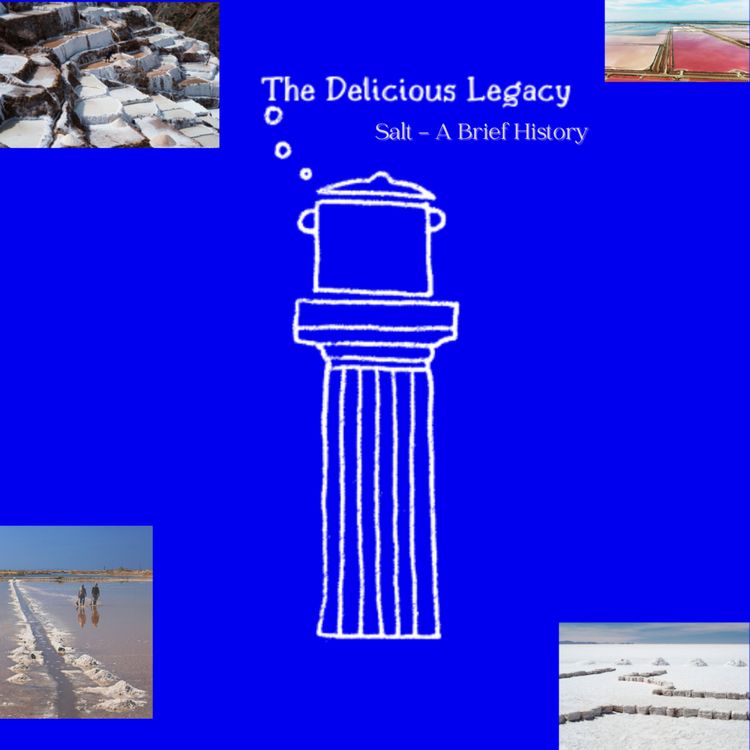
The Delicious Legacy
Salt- A Brief History
Season 3, Ep. 8
•
Salt!
Homer, Plato, Plutarch, Pliny and Livy all wrote about it in various forms.
Life saving, literally we can't survive without salt our bodies won't function.
Preserving in more than one ways, giving us the chance to have food in the lean harsh winters...
Delicious in so many ways.
And yet not known too well, commonly misunderstood, and with many myths attached to it.
Let's explore the deep, ancient and fascinating history of salt!
Enjoy!
Music by Pavlos Kapralos
This episode comes with the welcome support of Maltby and Greek UK's No1 Delicatessen.
The Delicious Legacy
Support the podcast on Ko-Fi and Patreon for ad-free episodes!
More episodes
View all episodes
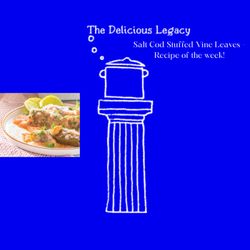
Cod Stuffed Vine Leaves: Recipe of the Week on Saturday
10:33|Hello!Today's recipe on a Saturday is Salt Cod Dolmades with tomatoey avgolemono (egg lemon) sauce:A Delicious Peloponnesian recipe for the winter times.In the interior of the Peloponnese, where fresh fish was rare dried fish such as cod became staple.Enjoy!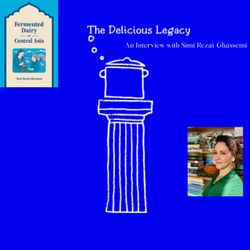
27. A History of Fermented Dairy in Central Asia - From the steppe to space!
01:02:00||Season 7, Ep. 27Hello my curious archaeogastronomers!A brand new episode is out, and it's all about the long history of fermented dairy foodstuffs from the vast regions of Central Asia.Fermented dairy products from Central Asia have been to space! Resilient and nutritious, and good for the bronze age and the space age, are truly interstellar travelers of our civilization! We all know yoghurt and kefir but have you heard of kumis, chortan, gooroot?For this reason I 've employed the expertise and knowledge of Dr Simi Rezai Ghassemi, to tell me all about the amazing, uknown, and life giving fermented dairy products of Central Asia countries, from Azerbaijan, to Iran, all the way to Mongolian steppe! The 4000 year old mummified remains of a woman known as "The Beauty of Xiaohe" have fermented dairy (kefir? cheese?) as necklace. A seemingly unbroken tradition of drying and preserving dairy for the long harsh environments of Central Asia since time immemorial...So who indeed invented the first kefir? This side of Caucasus or the desserts of China? All the above and much more on today's episode!More about the mummies found in Tarim Basin:https://www.penn.museum/sites/expedition/ancient-mummies-of-the-tarim-basin/Find out more about Dr Simi below:Web: https://simiskitchenblog.wordpress.comSubstack: https://srezaighassemi.substack.comIntagram: https://www.instagram.com/simiskitchen/Equinox: https://equinoxpub.com/projects/fermented-dairy-of-central-asiaAnyway enjoy our fascinating chat here!Love,Thom & The Delicious Legacy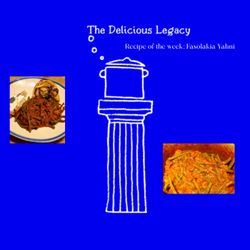
Sunday Recipe of the Week: Fasolakia Yahni (aka Greek Green Bean Stew)
07:55|Hello!New recipe of the week is out!This one is called "Fasolakia Yahni" and it's a classic of the "lathera" family of dishes, usually vegetarian. The name means "oily" aka cooked in lots of great Greek extra virgin olive oil! With music from Miltos Boumis.Enjoy!LoveThom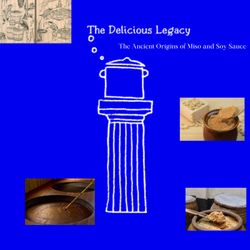
26. The Ancient Origins of Miso and Soy Sauce
57:43||Season 7, Ep. 26Hello!Brand new episode is out and I'm excited about it!World fermentation day was on February 1st, just three days ago.And what better way to celebrate with two amazing inventions of humankind?Is miso the most astounding transformation in the world of fermentation?From ancient Chinese meat and fish based pastes to Buddihst monks taking the craft to Japan the story of Miso and Soy Sauce has a long long at least three thousand year old history!Ok, enjoy today's episode!Some links:Excellent traditional soy sauce maker:https://kaneyoshi.co/english/Kioke Shoyu Brewers Revival Youtube channel:https://www.youtube.com/watch?v=K72eethJuU8&list=PLkakkeid1iaj55xr57PzNV-w7uKDLE-Eb&index=1https://kioke.jp/en4-brewersMy links/ recommendations for the week:Aubergines Braised With Trahana | My Greek Table with Diane Kochilas:https://www.youtube.com/watch?v=N5ni0hu7UDQGreek Farms | Apaki & Syglino: Taste Greece’s Tradition:https://www.youtube.com/watch?v=dinXaNT2LlMHow Extra-Virgin Olive Oil Is Made In Greece | Regional Eats | Food Insider:https://www.youtube.com/watch?v=l4GrYUUcQG0Sources:https://archive.org/details/bookofmisosavory0000shur_j6b4/page/20/mode/2uphttps://www.theguardian.com/world/2025/may/21/without-time-there-is-no-flavour-a-south-korean-grand-master-on-the-art-of-the-perfect-soy-sauceThe Noma Guide to Fermentation: Rene Redzepi & David ZilberEnjoy!Thom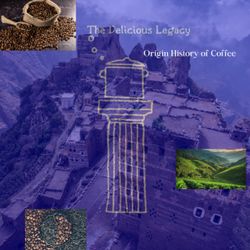
25. Origin History of Coffee (Reprise)
52:31||Season 7, Ep. 25Hello!What happened in Paris in 1669 that ushered the fashion of Coffee in France?What's the popular myth of the introduction of coffee in Europe and the cafe culture that has to do with the siege of Vienna?And how an Ethiopian goat herd named Kaldi is credited with the discovery of coffee?All this and more, exploring the long history of coffee and it's myths from the Cloud forests of Ethiopian highlands to the deserts of Arabia and beyond on this episode!Enjoy! Sources and Credits for this episode:Books:-A people's history of coffee and cafés by Biderman, Bob-The devil's cup : coffee, the driving force in history by Allen, Stewart Leehttps://insidearabia.com/coffee-the-lost-treasure-of-yemen/ And podcasts that deal with the subject in much more detail:A History of Coffee:https://www.spreaker.com/user/filterstories/episode-1-draft-8-ahoc-channelOriginal Music by Pavlos Kapralos & Miltos BoumisMotion Array Music:-UNCOVERING THE TRUTH A Rhian Talisein Sheehan Karl Solve Steven-Ashot Danielyan - Above The Long Desert- Arabia- Spirit of Oman-EMilarMusic&Audio_Shattered_StoneThat's it!Now go and listen to the episode!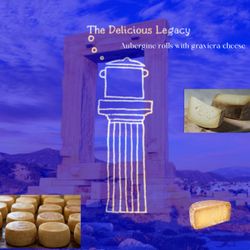
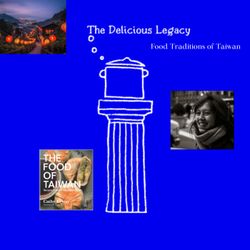
24. Food Traditions of Taiwan -Interview with Cathy Erway
54:25||Season 7, Ep. 24Hello my curious archaeogastronomers!New episode is out for your delight!An interview with food writer Cathy Erway about the foodways and dishes from the beautiful island of Taiwan!Recommendations for the week:The Library of Ancient Wisdom by Selena Wisnomhttps://www.penguin.co.uk/books/443027/the-library-of-ancient-wisdom-by-wisnom-selena/9780241519639The Ottoman History Podcast:https://www.ottomanhistorypodcast.com/The Hungry Historians podcast:https://open.spotify.com/show/2dd70WM8rXd2rMKepkbjwuEnjoy!LoveThom & The Delicious Legacy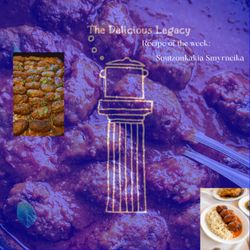
Soutzoukakia Smyrneika (Spicy meat balls from Smyrna)
13:16|Hello!Your recipe of the week on a Saturday is out! And what better dish than a Greek Sunday favourite?Izmir, Smyrni or Smyrna:One city, three names, a shared history of three thousand years! Being “born” in such a place, in the crossroads of trade, our recipe for “Soutzoukakia Smyrneika” or Izmir kofte encompasses spices valuable for trade and meat and ideas from East and West. And thus making a syncretic dish, delicious, luxurious and celebratory.Enjoy!Thom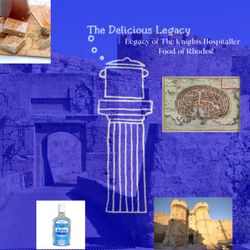
23. Legacy of The Knights Hospitaller - Food of Rhodes!
26:31||Season 7, Ep. 23Hello!Rhodes is a rich history island with a lush landscape and an illustrious past.After the fall of Acre in 1291 CE, the Knights Hospitaller last stronghold in the East Med for the next two centuries was the island of Rhodes.Rhodes is the biggest island of the Dodecanese complex, and place of trade in the eastern Mediterranean for more than three thousand years!What is 'Souma', and 'Melekounia'? And how do the Rhodians use cyclamen in their cooking?Let's find out about here food here!Enjoy!ThomThe Delicious Legacy Podcast